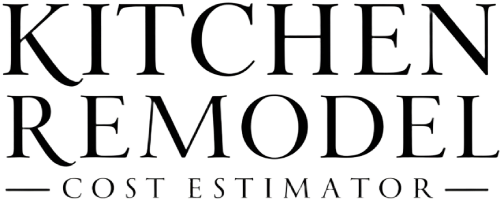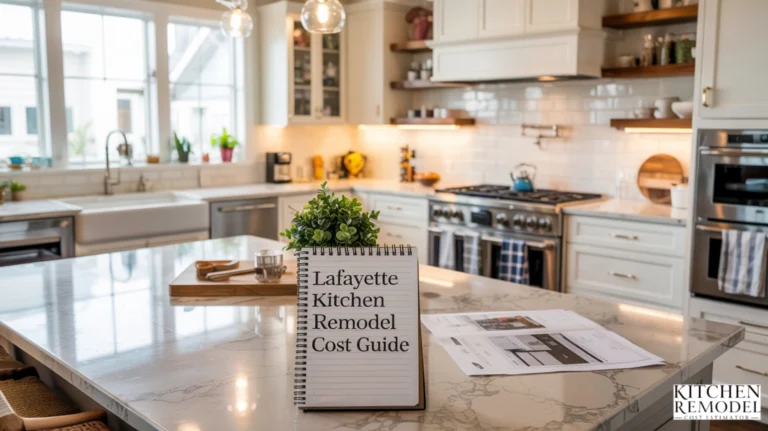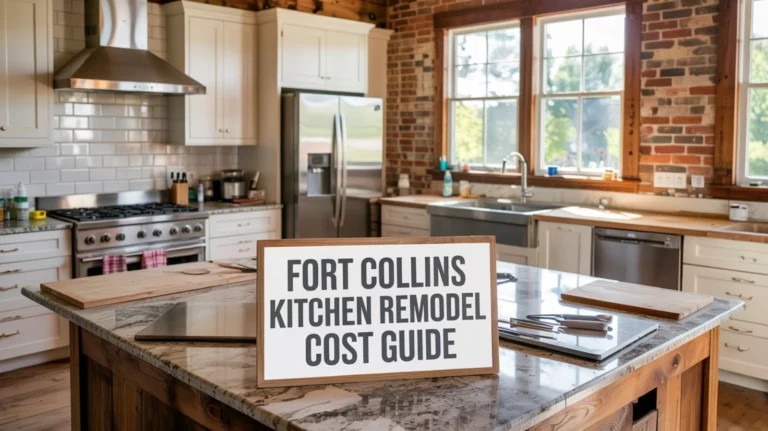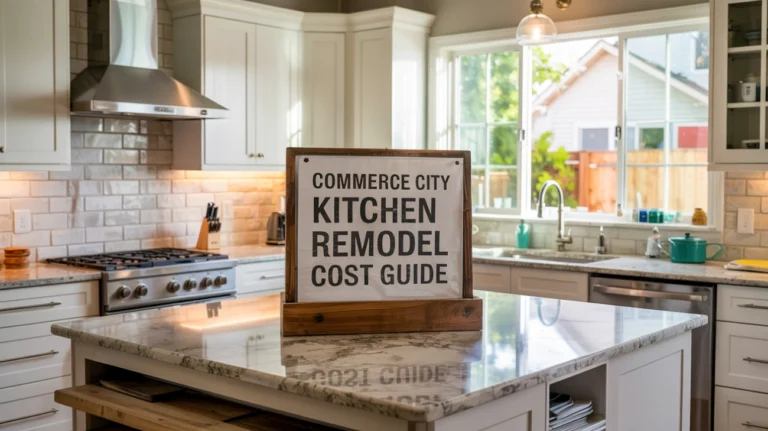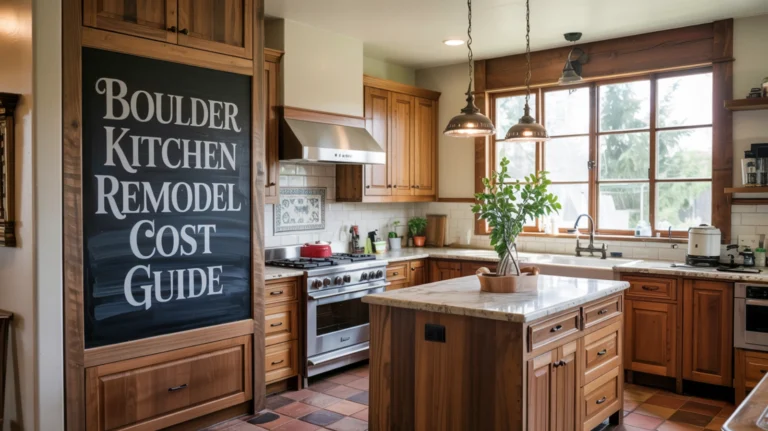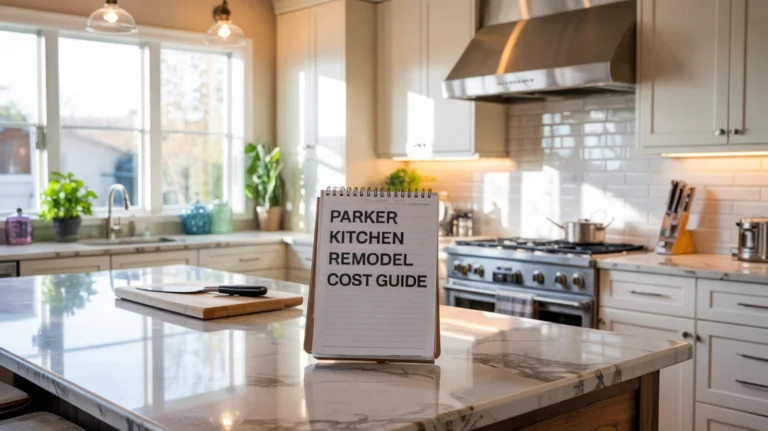When your kitchen feels outdated in Greeley, you’re facing the classic Colorado homeowner’s dilemma: how much to invest in a space where both mountain views and practical function matter. Your budget will shape every decision from those quartz countertops you’ve been eyeing to whether that load-bearing wall comes down to create the open concept you’ve dreamed about.
So what will renovating your Greeley kitchen actually cost?
The average kitchen remodel cost in Greeley, Colorado ranges from $14,000 to $37,000. Budget remodels with stock materials and basic layouts start around $14,000. High-end remodels featuring custom finishes, upgraded appliances, and structural changes can exceed $37,000.
Kitchen Remodel Cost Estimator for Greeley
Greeley Kitchen Remodel Cost Calculator
Get an estimate for your kitchen renovation based on your specifications.
Estimated Kitchen Remodel Cost
This estimate is based on national averages and may vary based on your location, material availability, contractor rates, and other factors. Prices are estimates only and should be used for planning purposes.
Looking for more accurate costs in your area? Search for location-specific remodel costs.
Greeley Kitchen Remodel Cost Benchmarks
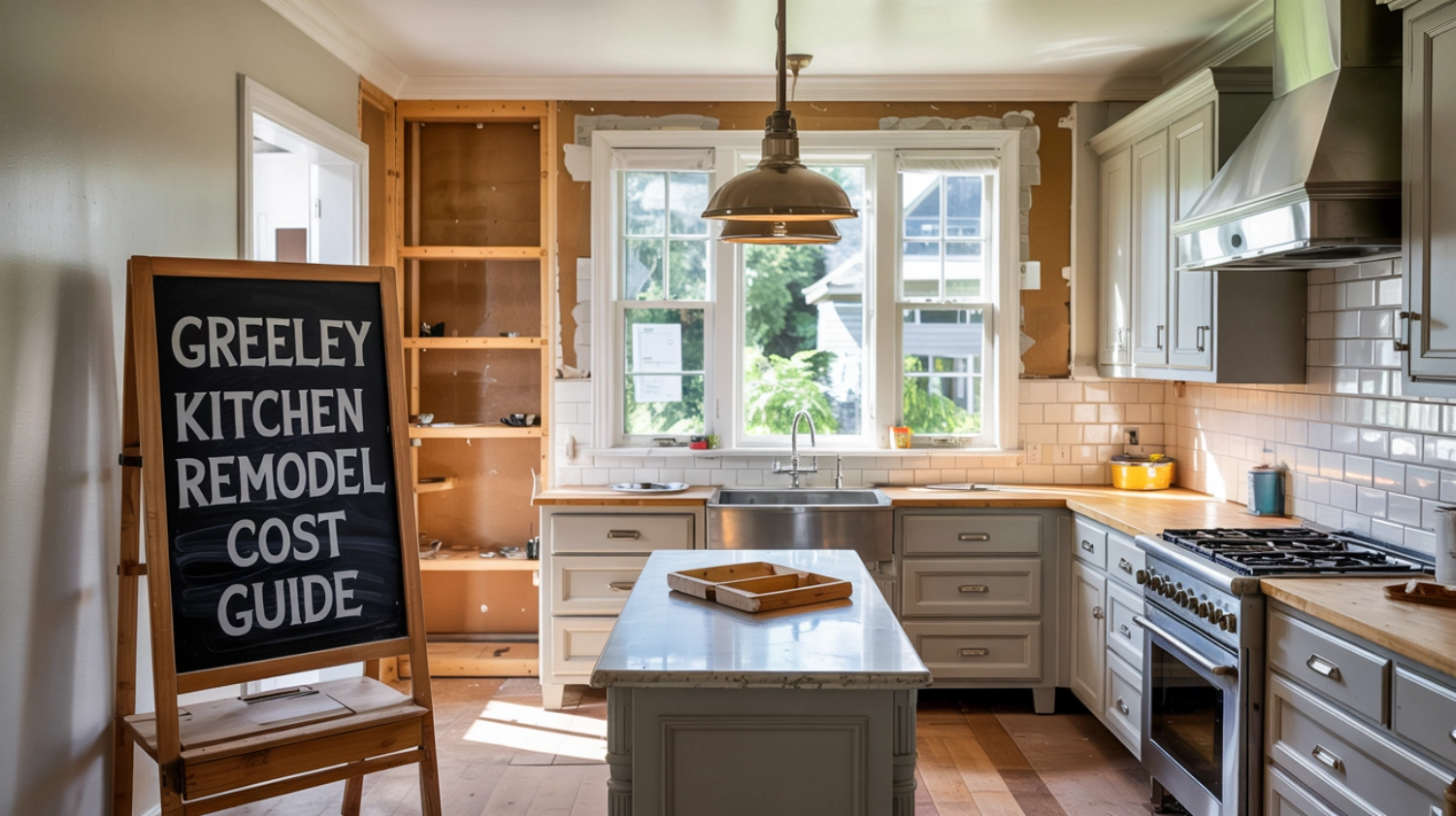
Dreaming about that kitchen renovation in Greeley, Colorado? Let’s talk money. Before you start tearing out cabinets or shopping for quartz countertops, you’ll want to know what this project might cost you.
I’ve broken down the typical expenses for kitchen remodels in the Greeley area based on project scale. Think of this as your financial roadmap—helping you navigate from “I want a new kitchen” to “I know what I can afford.”
Cost Ranges by Project Scope
What you’ll pay for your kitchen remodel depends dramatically on how deep you want to go. Are you thinking about a refresh with new cabinet fronts and countertops? Or are you imagining a complete transformation with custom everything?
The difference isn’t just aesthetic—it’s thousands of dollars.
Let’s explore what you might expect to pay for different levels of kitchen renovations in Greeley, from simple updates to magazine-worthy transformations.
Minor Remodel Costs
A minor remodel is essentially a kitchen facelift. You’re keeping the bones of your kitchen intact but upgrading the surfaces and possibly the appliances.
What does this typically include? You’ll likely replace or reface cabinet fronts (keeping the existing boxes), add new hardware, swap out appliances for energy-efficient models, install new countertops (often laminate), put in a mid-priced sink and faucet, lay down fresh flooring, and add a coat of paint.
So what will this cost you in Greeley?
The numbers vary widely. The 2024 Cost vs. Value report puts the national average for a minor mid-range kitchen remodel at $27,492. Other sources float figures around $24,000 or suggest ranges between $10,000 and $20,000.
For the truly budget-conscious, basic cosmetic updates might run as low as $7,000 to $10,000. If you’re working with a small kitchen (70–100 sq. ft.), simple upgrades could cost between $20,000 and $40,000.
Looking at Denver-specific data (the closest major metro to Greeley), estimates align with the lower end—suggesting $7,000-$10,000 for basic refreshes.
When we break it down per square foot, national estimates range from $75 to $250, with the lower figure likely representing purely cosmetic updates.
Denver-specific estimates run higher at $190-$375 per square foot, though this probably encompasses more than just minor remodels. General Colorado estimates suggesting $15-$60 per square foot seem suspiciously low for kitchen-specific work unless you’re talking about extremely basic updates.
Mid-Range Remodel Costs
Ready to take your kitchen renovation up a notch? Mid-range remodels represent what most homeowners think of when they imagine a “proper” kitchen renovation.
This is where you’re not just changing the face of your kitchen—you’re changing its functionality too.
A mid-range remodel typically involves completely replacing your existing cabinets with semi-custom wood options. You’ll get new countertops (perhaps laminate or solid surface), all new energy-efficient appliances (range, ventilation, microwave, dishwasher, disposal), a new sink and faucet, updated lighting, and fresh flooring.
Many homeowners at this level also add that coveted kitchen island—usually around 3×5 feet—to create more workspace and storage.
So what’s the damage to your wallet?
The price tags for mid-range kitchen remodels in the Greeley area show significant variation. The 2024 Cost vs. Value report estimates the national average for a major mid-range kitchen remodel at $79,982. Home Depot’s figures align closely, suggesting around $69,000.
Other sources offer wider ranges that might feel more accessible. You’ll see estimates between $20,000-$65,000 or $40,000-$75,000 for medium-sized kitchens (100-200 sq. ft.).
Some estimates skew lower, with figures like $11,000-$25,000 or $22,000-$46,000. Denver-specific numbers include an average of $27,000 and a range of $11,000-$25,000.
General Colorado estimates present an average of $25,000 or a much steeper range of $50,000-$150,000. When real homeowners share their experiences, you’ll hear numbers like $50,000-$75,000 for mid-level finishes or around $60,000.
Looking at per-square-foot costs, mid-range projects typically fall between $75-$250 nationally or $190-$375 in the Denver area. The Denver estimate for medium kitchens ($19,000-$75,000 total for 100-200 sq ft) translates to approximately $190-$375 per square foot.
This level of renovation represents the sweet spot for many homeowners—significant improvements to both function and aesthetics without the premium price of a high-end overhaul.
Upscale Remodel Costs
Ever walked into a kitchen that made you gasp? That’s what we’re talking about here.
Upscale kitchen remodels are complete transformations where luxury, customization, and performance take center stage. Nothing is standard; everything is exceptional.
What’s included at this top tier? Custom cabinetry (often with built-in features like sliding shelves), stone countertops (granite, quartz, or marble) paired with premium backsplashes in ceramic or glass tile, undermount sinks with designer faucets and water filtration systems, and commercial-grade appliances that might include built-in refrigerators, professional cooktops, high-powered vent hoods, wall ovens, and drawer microwaves.
You’ll also see sophisticated lighting systems (including undercabinet lighting), and premium flooring like high-end tile or authentic hardwood.
At this level, significant layout changes involving structural modifications are common. Your contractor might be moving walls, raising ceilings, or adding windows.
What does all this luxury cost in Greeley?
The 2024 Cost vs. Value report sets the national average for a major upscale kitchen remodel at $158,530. Home Depot’s estimate aligns at approximately $136,000.
Other sources suggest ranges like $65,000-$130,000+, $75,000-$150,000+, or simply $50,000-$150,000. One source cites $42,000-$60,500+, but this seems unusually low for truly upscale work.
Denver-specific estimates for high-end kitchen remodels range from $38,000 to $150,000 or higher. Anecdotal reports from homeowners with luxury kitchens can readily reach $150,000-$300,000 depending on the level of customization and premium selections.
Looking at per-square-foot costs, upscale projects sit at the higher end of both national ($75-$250/sq ft) and Denver ($190-$375/sq ft) estimates. Large kitchens (200+ sq ft) in the Denver area, estimated at $55,000-$112,500+ total, could potentially reach $275-$560 or more per square foot.
Another Colorado source suggests $150-$350 per square foot for general high-end home renovations, which aligns with what you might expect for premium kitchen transformations.
This level represents a top-tier investment—the kind that transforms not just your cooking space but potentially your entire home’s value and your daily experience within it.
Cost Allocation Breakdown
Ever wonder where all that money actually goes during a kitchen remodel? Understanding how your budget gets distributed across different components is crucial for planning and making smart compromises if needed.
%%{init: {'theme': 'base', 'themeVariables': { 'primaryColor': '#4a90e2', 'primaryTextColor': '#ffffff', 'primaryBorderColor': '#3b71ca'}}}%%
pie
title Typical Kitchen Remodel Cost Breakdown
"Cabinets" : 29
"Installation / Labor" : 17
"Appliances & Ventilation" : 14
"Countertops" : 10
"Flooring" : 7
"Lighting" : 5
"Backsplash" : 5
"Walls & Ceilings (Paint)" : 5
"Doors & Windows" : 4
"Faucets & Plumbing" : 4
Let’s break down the typical spending patterns for kitchen remodels in the Greeley area.
Typical Percentage Distribution
When you look at industry reports and contractor estimates from the Greeley region, a clear pattern emerges in how budgets get allocated.
Would it surprise you to learn that cabinets typically eat up almost a third of your budget?
Take a look at how a typical kitchen remodel budget gets sliced up:
| Item | Average Budget Percentage | Notes |
|---|---|---|
| Cabinets | 29% | Often the largest single expense |
| Installation / Labor | 17% | Highly variable based on location and complexity |
| Appliances & Ventilation | 14% | Costs vary significantly by brand and features |
| Countertops | 10% | Material choice heavily influences cost |
| Flooring | 7% | Depends on material and area |
| Lighting | 5% | Includes fixtures and potentially electrical work |
| Backsplash | 5% | Material and complexity impact cost |
| Walls & Ceilings (Paint) | 5% | Relatively lower cost but essential for finish |
| Doors & Windows | 4% | If replaced or added |
| Faucets & Plumbing | 4% | Includes fixtures and labor if plumbing is moved |
This breakdown isn’t just interesting trivia—it’s a practical framework for budgeting. It helps you set realistic expectations for how much you should allocate to each component relative to your total budget.
Want to save money? Now you know where the big costs are. Or maybe you want to splurge on that dream range but need to find savings elsewhere? This distribution gives you a starting point for those decisions.
Labor Cost Factors
Think cabinets and countertops are your biggest expenses? Sometimes the hands that install them cost even more.
Labor represents a substantial—and highly variable—chunk of your kitchen remodel budget. While benchmarks suggest an average of about 17% going to labor, real-world examples tell a different story. One basic remodel breakdown allocated a whopping 45% to labor.
So what are you paying for, exactly?
In Colorado, skilled tradespeople generally charge between $80 and $150 per hour, depending on their specialty and experience level. Specialized work like electrical and plumbing often commands premium rates.
But here’s where it gets tricky: The total cost associated with labor extends beyond just paying the people swinging hammers and installing cabinets.
When you hire a general contractor, their fee typically includes charges for project management, overhead, insurance, and profit—all factored into your total project cost.
The complexity of your project dramatically impacts labor hours. Moving plumbing or electrical lines, altering structural walls, or installing intricate custom features requires substantially more time and expertise than straightforward cosmetic updates.
And don’t forget local market conditions. The current demand for skilled labor in the Greeley area directly influences the rates you’ll pay.
What about DIY?
Choosing to perform some or all of the work yourself can lead to substantial savings—potentially lowering your total project costs by 18.6% to 50.8% compared to hiring professionals. Average DIY remodel costs might range from $2,500 to $12,000, a fraction of professionally managed projects.
But before you grab that sledgehammer, consider what you’re giving up. Professional project management, coordination between different trades, adherence to building codes, and quality of execution all have real value.
When getting quotes, ask for detailed breakdowns that clearly separate labor and material costs. This transparency helps with budget management and makes comparing different contractors’ proposals much easier.
Return on Investment Analysis
“Will I get my money back when I sell my home?”
It’s the question on every remodeler’s mind. Let’s look at what you might expect to recoup from your kitchen renovation investment when you eventually sell your Greeley home.
This analysis draws primarily from national and regional findings of the annual Cost vs. Value report, which serves as a reasonable proxy for the Greeley market. Keep in mind that return on investment (ROI) percentages fluctuate annually based on construction costs and real estate market conditions. Recently, exterior home improvements have been showing higher ROI than large interior projects.
ROI for Kitchen Remodels (Greeley/Mountain Region Proxy)
Not all kitchen remodels deliver the same financial return. In fact, the relationship between investment and return follows a surprisingly clear pattern.
Minor Mid-Range Remodel ROI
Here’s a pleasant surprise: Minor kitchen remodels consistently deliver the highest ROI among kitchen projects.
The 2024 national average shows a 96.1% cost recouped for a minor mid-range remodel. That means for an average investment of $27,492, homeowners are seeing an estimated $26,406 added to their home’s resale value.
That’s up considerably from the 85.7% national average reported in 2023. An older Colorado-specific source from 2014 cited 83.5% for a minor kitchen remodel.
Why such strong returns? Buyers place significant value on updated kitchen aesthetics and basic functionality. The relatively lower cost of these projects makes the investment financially efficient at resale.
Major Mid-Range Remodel ROI
As you increase your spending, the percentage you recoup typically decreases.
The 2024 national average shows a 49.5% cost recouped for a major mid-range remodel. This reflects an average project cost of $79,982 adding an estimated $39,587 to resale value.
This represents a slight improvement over the 41.8% national average in 2023. One regional source cited a similar 51% ROI for projects involving layout changes and islands.
Why the lower return percentage? The substantial cost increase compared to minor remodels, coupled with the possibility that your specific design choices may not perfectly align with buyer preferences, contributes to the lower percentage recouped.
Major Upscale Remodel ROI
Luxury doesn’t necessarily translate to financial return. Upscale kitchen remodels, involving the highest investment level, typically yield the lowest ROI percentage.
The 2024 national average shows just 38.0% cost recouped for a major upscale remodel. This reflects an average project cost of $158,530 contributing an estimated $60,176 to resale value—up from 31.7% in 2023.
Why such a low percentage? The highly personalized nature and premium cost of luxury finishes may not appeal to a broad market segment or be valued proportionally to their expense at resale.
Kitchen Remodel ROI Comparison (National Averages – 2024)
| Project Scope | Job Cost | Resale Value | Cost Recouped (ROI) |
|---|---|---|---|
| Minor Kitchen (Midrange) | $27,492 | $26,406 | 96.1% |
| Major Kitchen (Midrange) | $79,982 | $39,587 | 49.5% |
| Major Kitchen (Upscale) | $158,530 | $60,176 | 38.0% |
The pattern is clear: As kitchen remodel scope and expenditure increase, the percentage of cost recouped diminishes.
Minor remodels, addressing visible signs of aging and improving basic functionality at a relatively low cost, align well with buyer expectations and offer the most financially efficient return at resale.
Major and upscale remodels involve significant expenses in structural components, potentially taste-specific materials, and luxury items that simply don’t translate dollar-for-dollar into resale value.
The market consistently values functional updates and modern aesthetics more reliably than expensive, highly personalized overhauls. Therefore, if you’re planning a major or upscale project, do it primarily for your own enjoyment and lifestyle improvement—recognizing that a substantial portion of the cost may not be recovered when you sell.
For the most accurate assessment of potential value added by any renovation in your specific Greeley neighborhood, checking comparable recent sales is essential.
Materials: Costs, Standards, and Local Availability
The materials you select for your Greeley kitchen remodel profoundly impact not just the final look and functionality, but also your budget. Let’s explore the common options available locally, what they typically cost, and the standards that ensure quality.
Countertop Materials
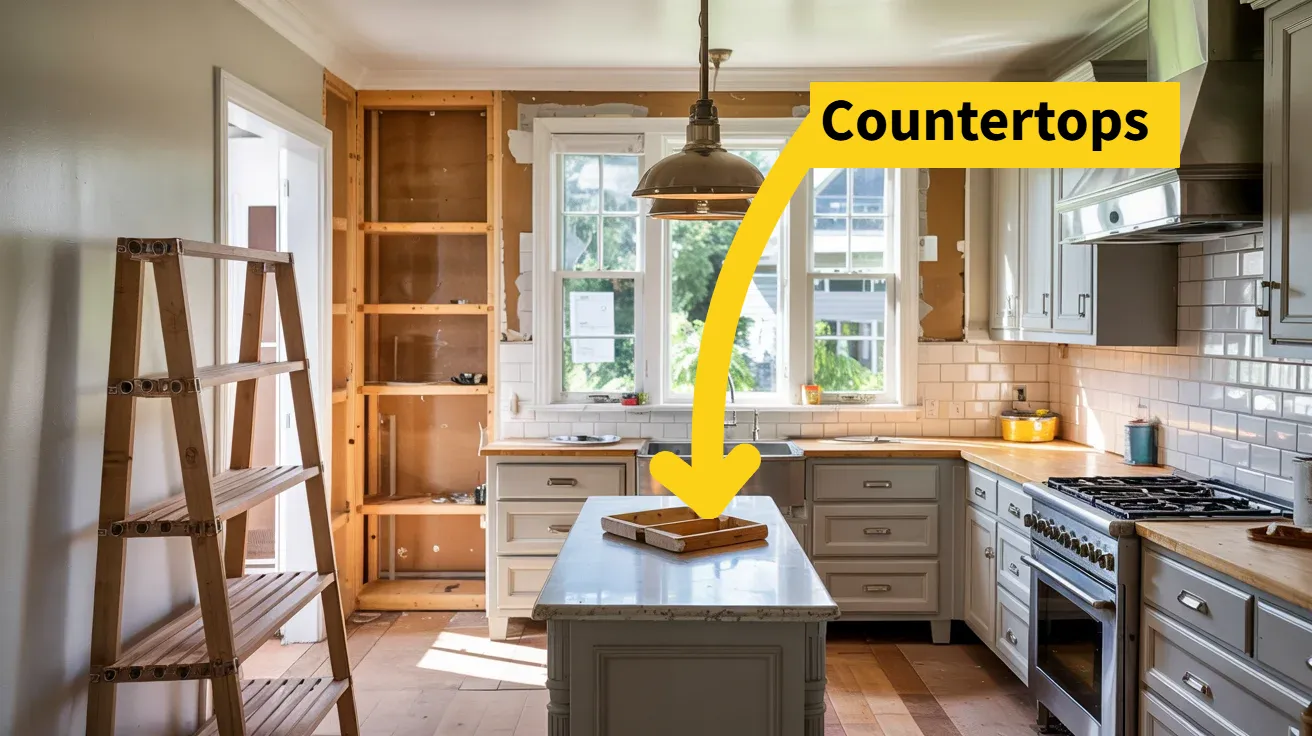
When you walk into a kitchen, what’s the first thing you notice? For many, it’s the countertops. These surfaces dominate the visual space and take the brunt of your kitchen activities.
Granite
Granite remains a classic choice in Greeley kitchens, prized for its durability and unique patterns.
But what will it cost you? National averages vary widely, from $43-$140 per square foot or $30-$55 per square foot for standard grades. Colorado-specific data shows an average installed cost of $90.63 per square foot (ranging from $85.53-$95.73) for a 1.25-inch, level 1 custom slab. Costs climb for higher grades or more exotic patterns.
Granite isn’t just beautiful—it’s engineered to perform. Quality and performance are assessed using standards like ASTM C97 (Water Absorption, Specific Gravity), ASTM C170 (Compressive Strength), ASTM C880 (Flexural Strength), and ASTM C241/C1353 (Abrasion Resistance). Lower water absorption rates are generally preferred for kitchen applications.
Granite is readily available from local suppliers in Greeley, including large retailers like Home Depot and specialized stone fabricators. It remains a popular and timeless choice in the region.
Quartz (Engineered Stone)
Want the look of natural stone with fewer maintenance headaches? Quartz might be your answer.
This engineered material is made primarily from crushed natural quartz bound with resins. National averages range from $59-$130 per square foot or $45-$125 per square foot depending on quality and brand. Colorado-specific data shows an average installed cost of $82.23 per square foot (range $72.08-$92.38) for a 1.25-inch slab.
As an engineered product, specific manufacturer specifications matter. Performance is often evaluated against natural stone standards like ASTM C97, C170, and C880. Health-conscious homeowners might look for certifications like Greenguard Gold for low volatile organic compound (VOC) emissions.
Quartz is widely available locally and extremely popular due to its durability, non-porous nature (requiring no sealing), stain and scratch resistance, and consistent appearance across a vast range of colors and patterns. It’s frequently featured in modern and contemporary Greeley kitchen designs.
Laminate
Working with a tight budget? Laminate countertops offer the most economical option.
This budget-friendly choice consists of layers of paper and resins bonded to a substrate. National averages range from $19-$45 per square foot. Colorado-specific data indicates an average installed cost of $40.10 per square foot (range $36.55-$43.65).
The substrate material (often particleboard or MDF) should meet relevant standards like ASTM D1037, particularly for moisture resistance in areas near sinks. The Architectural Woodwork Institute standard ANSI/AWI 1236 provides requirements for decorative laminate countertops.
Laminate is readily available through local suppliers and offers a wide array of designs and colors. While less resistant to heat and scratches compared to stone or quartz, it remains a common choice for basic or budget-focused Greeley remodels.
Countertop Material Cost Comparison (Colorado Averages – $/sq ft Installed)
| Material | Average Cost/sq ft | Cost Range/sq ft | Notes |
|---|---|---|---|
| Laminate | $40.10 | $36.55 – $43.65 | Budget-friendly, wide design range |
| Corian (Solid) | $55.38 | $50.75 – $60.00 | Seamless look, mid-range cost |
| Quartz | $82.23 | $72.08 – $92.38 | Durable, low maintenance, popular |
| Granite (Lvl 1) | $90.63 | $85.53 – $95.73 | Natural stone, durable, requires sealing |
| Marble | $124.86 | $116.74 – $132.98 | Luxury look, higher maintenance |
Cabinet Materials
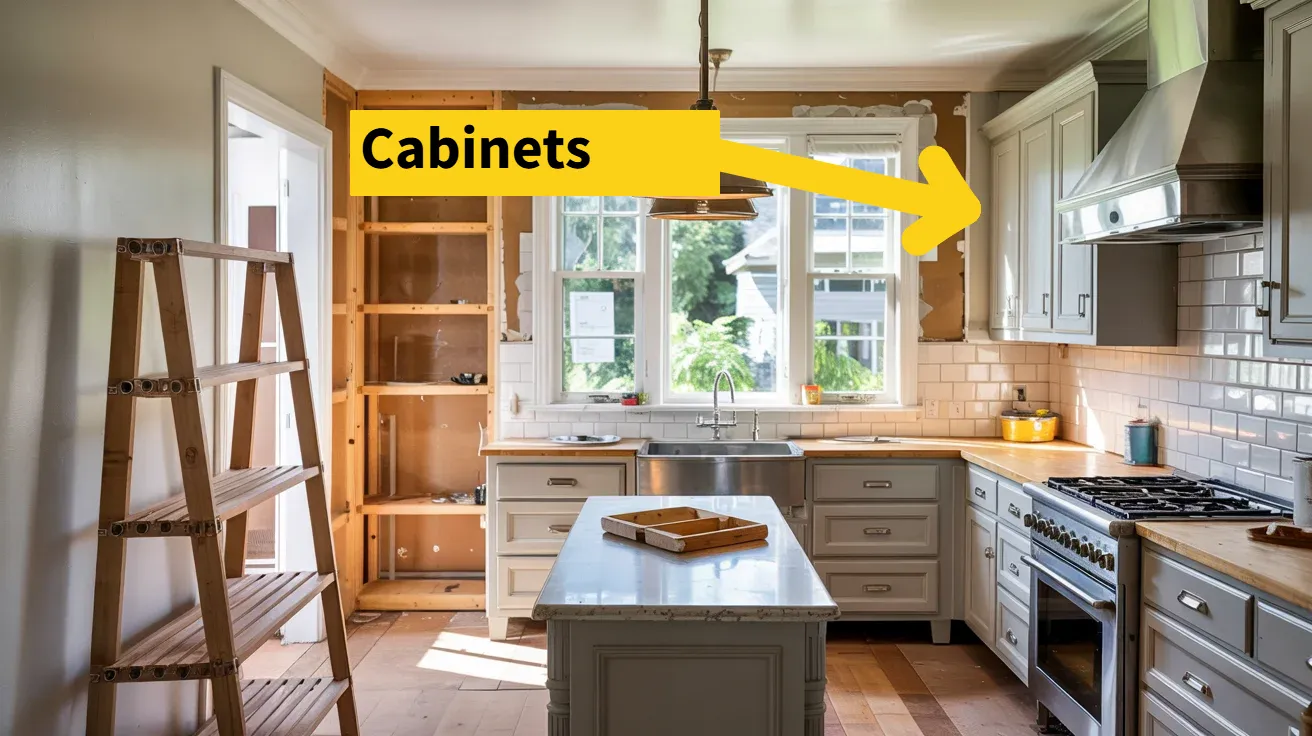
Cabinets typically consume the largest portion of your kitchen remodel budget while defining both storage capacity and style. Material choices range from solid wood to engineered products like MDF and plywood.
Solid Wood
Looking for that premium, natural cabinet look? Solid wood delivers beauty and durability but at a price.
Costs vary significantly based on wood species (common options include Oak, Maple, Cherry, Birch, Hickory), construction quality, and customization level. Estimates for a standard 10×10 kitchen range from $5,000 to $30,000+. Custom cabinets can cost $500 or more per linear foot or $500-$1,200+ per box. Semi-custom solid wood options might range from $2,000-$12,000 for a 10×10 kitchen.
Quality standards focus on formaldehyde emissions from adhesives and finishes, governed by regulations like California Air Resources Board (CARB) ATCM and U.S. EPA TSCA Title VI. Construction quality can be assessed against standards like ANSI/AWI 0641 (Architectural Wood Casework) and material grades defined in AWI 300. The Kitchen Cabinet Manufacturers Association (KCMA) certification indicates adherence to construction and performance standards.
Solid wood cabinets are available from custom cabinet shops in the Greeley region and as higher-end options from major suppliers. Natural wood tones, particularly White Oak and Walnut, are trending locally. Pro tip: Using locally sourced wood acclimated to Colorado’s dry climate can minimize issues like expansion and contraction.
MDF/Plywood
Want durability without the premium price tag? Engineered wood products offer practical alternatives.
Plywood construction is generally considered more durable and moisture-resistant than Medium-Density Fiberboard (MDF) or particleboard, and typically costs more. Plywood boxes might range from $150-$400 per box. MDF provides a smooth, stable surface ideal for painted finishes and is often more budget-friendly, potentially ranging from $75-$250 per box. Ready-to-assemble (RTA) and stock cabinets frequently utilize these materials, with costs ranging from $1,000 to $8,000 depending on size and quality.
Substrate materials must comply with formaldehyde emission standards. Material property standards include ASTM D1037, which is crucial for assessing moisture resistance, especially for sink base cabinets. ANSI A208.1 (Particleboard) and ANSI A208.2 (MDF) define grades. Plywood grades are relevant for veneer quality. Box construction standards defining material thickness and joinery methods are outlined in guidelines like ANSI/AWI 0641.
These materials are ubiquitous in stock, semi-custom, and custom cabinet lines available locally. Plywood box construction is often specified or preferred for its perceived higher quality and durability compared to particleboard.
Cabinet Material/Type Cost Comparison
| Cabinet Type/Material | Estimated Cost Range | Notes |
|---|---|---|
| RTA / Stock (MDF/PB) | $100 – $300 / box | Budget option, requires assembly (RTA) or limited sizes (Stock) |
| Semi-Custom (MDF/Ply) | $200 – $750 / box | More flexibility in size/finish, common choice |
| Custom (Plywood/Wood) | $500 – $1200+ / box | Highest cost, fully customized, premium materials |
| Solid Wood (General) | $5,000 – $30,000+ (10×10 Kit) | Varies greatly by species, construction, and customization level |
| Linear Foot (General) | $50 – $1,500 / linear ft | Broad range covering stock to high-end custom |
Flooring Materials
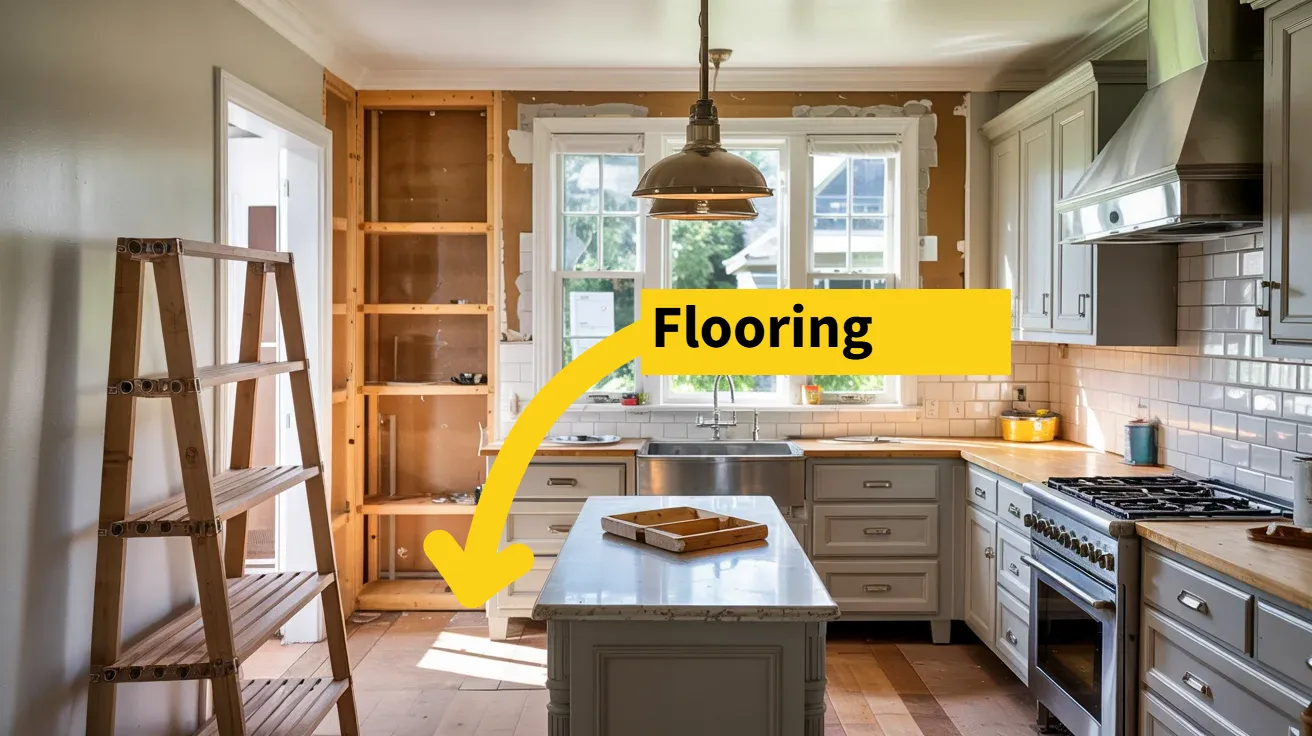
Kitchen flooring faces a tough job: It needs to look great while standing up to spills, dropped pots, and constant foot traffic.
Tile (Ceramic/Porcelain)
Want the most durable flooring option? Look to tile.
Material costs vary significantly, from under $1 to over $40 per square foot. Installation labor is a major cost factor, potentially $6 per square foot or more, making the total installed cost considerably higher than other options. Overall installed costs might range from $1,000 to $4,000 or more for an average project, depending heavily on tile selection and area size.
ANSI A137.1 provides specifications for ceramic tile, including testing methods for properties like water absorption and dynamic coefficient of friction (DCOF), which is critical for assessing slip resistance in potentially wet kitchen environments.
Tile represents a durable and practical choice for Greeley kitchens and is widely available from local flooring suppliers. Just remember that high labor costs for installation must be factored into your budget.
Luxury Vinyl Plank (LVP)
Want the look of wood without the maintenance concerns? LVP has become incredibly popular in Greeley kitchens.
Material costs typically range from $3 to $7 per square foot. Installation labor is generally less expensive than tile, estimated around $2.00-$3.50 per square foot. This results in a lower overall installed cost compared to tile, often falling within the $1,500-$4,500 range for an average project.
LVP is widely available in the region, offering the aesthetic of wood with enhanced water resistance compared to laminate. Installation is typically quicker and more affordable than tile. Some durability concerns relative to tile may exist, but for many homeowners, the balance of looks, performance, and price is compelling.
Hardwood
Nothing matches the warmth and timeless appeal of real hardwood floors.
Material costs typically range from $6 to $22 per square foot, with installation adding to this cost. Total installed costs for new hardwood are often estimated at $10-$15+ per square foot. Refinishing existing hardwood floors is a more cost-effective option at approximately $3-$4 per square foot.
Relevant standards include ASTM D2394 (Simulated Service Testing), D4442 (Moisture Content Measurement), and D4933 (Moisture Conditioning), which are critical for ensuring proper acclimation and installation to prevent issues like buckling or gapping.
Hardwood offers timeless appeal and is valued by Greeley homeowners. It requires careful attention to sealing and maintenance in a kitchen environment due to potential exposure to moisture and spills. Medium wood tones are particularly popular in the region.
Flooring Installation Cost Comparison (Installed Cost – $/sq ft Estimates)
| Flooring Material | Estimated Installed Cost/sq ft | Notes |
|---|---|---|
| LVP | $5 – $11 | Lower labor cost, good water resistance, popular wood look |
| Hardwood (New) | $10 – $25+ | Adds value, timeless look, requires maintenance in kitchens |
| Tile | $10 – $45+ | Highly durable, water-proof, higher labor cost |
| Hardwood (Refinish) | $3 – $4 | Cost-effective if existing wood floor is present |
While technical standards define baseline quality and performance characteristics, your material selection in Greeley will likely be influenced by prevailing design trends. The locally favored aesthetic—often characterized by warm tones, natural wood or wood-look materials, durable quartz or granite countertops, and functional, stylish cabinetry like Shaker or two-tone designs—frequently requires materials that fall into mid-range to high-end cost categories.
Consequently, budgeting for a remodel that aligns with current local preferences may require anticipating costs beyond basic or minor project levels. The challenge? Balancing trendy aesthetics with budget constraints while ensuring your materials meet essential quality and safety standards.
Greeley Regulatory Requirements
Think you can just start tearing out cabinets this weekend? Not so fast.
Navigating Greeley’s regulatory landscape is a crucial (though admittedly less exciting) part of planning your kitchen remodel. Understanding building codes, the permit process, and associated costs will help you avoid expensive delays and potential legal headaches.
Building Codes and Standards
Every nail, wire, and pipe in your Greeley kitchen renovation must adhere to adopted building codes that ensure safety and structural integrity.
Applicable Codes
The City of Greeley enforces building standards based on adopted versions of model codes, primarily the International Residential Code (IRC) for dwellings. This includes related codes governing specific systems, such as the International Plumbing Code, International Mechanical Code, and the National Electrical Code (NEC).
Compliance with the city’s adopted versions isn’t optional—it’s mandatory for permitted work.
Key Code Requirements for Kitchens
What aspects of your kitchen remodel will face scrutiny from code officials? Quite a few, actually:
Structural: Planning to remove that wall to create an open concept? If it’s load-bearing, you’ll need proper engineering and support.
Electrical: Changes to wiring, adding circuits for new appliances, relocating outlets or switches, and ensuring Ground Fault Circuit Interrupter (GFCI) protection for receptacles near water sources (sinks, countertops) all fall under NEC requirements.
Plumbing: Relocating sinks, dishwashers, refrigerators with ice makers, or adding features like pot fillers means adhering to plumbing code requirements for supply lines, drain/waste/vent systems, and fixture installation.
Mechanical: That powerful range hood you’ve been eyeing? Its installation must meet code requirements for exhaust rates and ducting.
Gas: Moving or adding gas lines for ranges or cooktops requires compliance with gas code provisions.
General Safety: Adequate lighting, ventilation, and potentially egress requirements (depending on the extent of alteration) are also addressed by building codes.
Permitting Process and Costs
Obtaining the necessary permits is a required step for most kitchen remodels that go beyond simple cosmetic updates.
When Do You Need a Permit?
In Greeley, a building permit is generally required for any kitchen remodel that involves:
- Enlarging, altering, or repairing the structure
- Modifying electrical, gas, mechanical, or plumbing systems
This means projects involving layout changes, moving walls, relocating sinks or appliances, adding new electrical circuits, or altering ventilation typically need a permit.
Simple cosmetic work like painting, replacing countertops in the same location without plumbing changes, or refacing cabinets might not require a permit—but confirming with the Building Inspection division is always the safest approach.
The process involves submitting construction documents, including plans (site plan, floor plan, elevations showing materials, dimensions, specifications), for review and approval before you start swinging that sledgehammer.
Greeley Permit Fee Structure
Ready for some numbers? Building permit fees in Greeley depend on your project’s total valuation—both materials and labor costs combined.
The city uses a tiered fee schedule that looks like this:
| Total Valuation | Fee Calculation |
|---|---|
| $1 to $500 | $23.50 |
| $501 to $2,000 | $23.50 for first $500 + $3.05 per additional $100 (or fraction) |
| $2,001 to $25,000 | $69.25 for first $2,000 + $14.00 per additional $1,000 (or fraction) |
| $25,001 to $50,000 | $391.25 for first $25,000 + $10.10 per additional $1,000 (or fraction) |
| $50,001 to $100,000 | $643.75 for first $50,000 + $7.00 per additional $1,000 (or fraction) |
| $100,001 to $500,000 | $993.75 for first $100,000 + $5.60 per additional $1,000 (or fraction) |
| $500,001 to $1,000,000 | $3,233.75 for first $500,000 + $4.75 per additional $1,000 (or fraction) |
| $1,000,001 and up | $5,608.75 for first $1,000,000 + $3.65 per additional $1,000 (or fraction) |
But wait, there’s more! You’ll also pay plan review fees:
- A Minor Plan Review Fee of $75 applies to residential remodels under 1,000 square feet
- A Major Plan Review Fee, calculated as 65% of the building permit fee, is due when submitting plans for larger or more complex projects
And don’t forget sales tax. The City of Greeley imposes its sales tax (4.11%) on a portion of the total construction value for remodels. For projects other than new residential construction under $75k, the tax is calculated on 50% of the total job valuation.
Other potential fees include re-inspections ($75/hour), inspections outside normal business hours ($75/hour, minimum two hours), or temporary electrical service connections ($45).
Here’s the kicker: The more you spend on your remodel, the more you’ll pay in regulatory costs.
Those high-end materials and complex structural changes don’t just cost more in themselves—they also increase your permit fees and sales tax. It’s a cascading effect that amplifies the cost difference between minor, mid-range, and upscale projects in Greeley.
Building Inspection Contact Information
Need answers about codes, permits, plans, or fees? Contact the experts directly:
- Department Name: City of Greeley Building Inspection
- Address: 1100 10th Street, 3rd Floor, Greeley, CO 80631
- Phone: 970-350-9830
- Email: [email protected]
- Hours: Monday – Friday, 8:00 AM – 5:00 PM
For projects outside Greeley city limits but within Weld County, you’ll want the Weld County Building Department (970-400-6100). If you have zoning or land use questions, contact the City of Greeley Planning Division at 970-350-9780 or [email protected].
Local Design Considerations
What does a Greeley kitchen actually look like in 2025?
Kitchen design in Northern Colorado doesn’t exist in a vacuum. Local preferences, lifestyle factors, and the area’s natural surroundings all influence what homeowners want. Understanding these trends helps you make choices that will feel at home in Greeley—not just fashionable in a national magazine.
Prevalent Styles in Greeley/Northern Colorado
Looking at what local designers, remodelers, and trend reports are saying, several distinct patterns emerge in how Northern Colorado homeowners are designing their kitchens.
What’s Trending in Greeley Kitchens?
Remember the cool gray palettes that dominated for years? They’re fading fast.
Instead, Greeley kitchens are embracing warmth and natural elements. Think soft beige, warm taupe, and various shades of green. There’s a strong preference for incorporating natural materials—particularly wood finishes like white oak and walnut for cabinetry and accents, alongside stone countertops.
Why this shift? Many homeowners want spaces that connect with Colorado’s environment, bringing the outdoors in through organic textures and earth tones.
Style-wise, transitional designs dominate the landscape. These blend traditional comfort with clean, modern lines for a look that feels both fresh and timeless. Modern, Contemporary, updated Farmhouse, and Scandinavian-inspired designs are also gaining traction, with their emphasis on clean lines, minimalism, and functionality.
But Greeley kitchens aren’t just about looks—they’re working spaces.
Functionality and smart storage solutions rank high on homeowners’ wish lists. Deep drawers, pull-out shelves, dedicated spice storage, appliance garages, and well-designed pantry spaces help maximize efficiency and minimize clutter. Kitchen islands frequently serve as multifunctional hubs for food preparation, dining, and socializing.
Open-concept layouts connecting the kitchen to adjacent living areas remain the standard rather than the exception.
When it comes to cabinetry, white Shaker-style cabinets continue their long reign of popularity due to their timeless appeal and ability to brighten spaces. However, there’s a growing trend toward two-tone kitchens—often pairing white upper cabinets with darker base cabinets or a contrasting island in blues, greens, or dark wood tones.
Flat-panel cabinet doors frequently appear in more modern or contemporary designs, while natural wood finishes are making a significant comeback.
For countertops, quartz and granite lead the pack, valued for their durability, aesthetic versatility, and alignment with both natural and modern design trends. Quartzite is gaining ground as a natural, luxurious option. Features like waterfall edges on islands contribute to a high-end, modern feel.
How do Greeley homeowners add personality to their kitchens?
Often through mixed materials (combining wood, stone, metal), statement backsplashes (unique tile patterns or stone slabs), distinctive light fixtures, and varied metal finishes for hardware and faucets (matte black, champagne, bronze, gold).
How Trends Impact Your Budget
These local design preferences directly influence material choices and, consequently, what you’ll pay for your Greeley kitchen remodel.
The strong preference for natural wood cabinets or high-quality painted finishes, combined with the popularity of durable stone or quartz countertops, typically pushes material budgets toward mid-range and upscale levels compared to baseline options like laminate countertops and basic MDF cabinets.
Implementing a two-tone cabinet scheme? That often involves using premium finishes or materials for at least one part of the cabinetry, affecting your bottom line.
The emphasis on enhanced functionality and customized storage solutions (pull-outs, specialized drawers) frequently necessitates semi-custom or fully custom cabinetry rather than standard stock options, significantly increasing both material and potentially labor costs.
Achieving the desired look for popular styles like updated Farmhouse, sleek Modern, or sophisticated Contemporary often involves higher-quality materials and potentially more complex installation techniques (waterfall countertops, integrated appliances, custom lighting plans), influencing both material and labor expenditures.
What does this mean for your budget? The prevalent design trends in Northern Colorado that favor higher-quality materials, functional enhancements, and specific aesthetics suggest that homeowners aiming to align their remodel with current local styles should anticipate budgets in the mid-range or even upscale categories—think $40,000 and upwards.
This creates an interesting tension between the high financial ROI offered by strictly minor remodels and the investment required to achieve a kitchen aesthetic currently favored in the Greeley market. Sometimes what pays back best financially isn’t what feels most current or desirable to local homeowners.
Conclusion
The price tag on your Greeley kitchen remodel isn’t just a number—it’s a reflection of your priorities.
Minor updates might run under $20,000, while showstopping transformations can soar beyond $100,000. Cabinets and labor will devour nearly half your budget, no matter which path you choose.
Here’s the financial reality: minor remodels recoup an impressive 96.1% at resale, while that figure plummets to just 38% for upscale projects. Sometimes the smartest investment isn’t the most expensive one.
Yet there’s tension between what pays back financially and what feels current. Those quartz countertops and custom storage solutions that define today’s Greeley aesthetic push budgets firmly into mid-range territory.
The successful kitchen remodel balances what you can afford, what functionality you need, what aesthetic you love, and what regulations demand.
Sometimes that means compromise. But with clear expectations about costs, requirements, and local preferences, you’ll create a space that delivers both immediate joy and lasting value.
